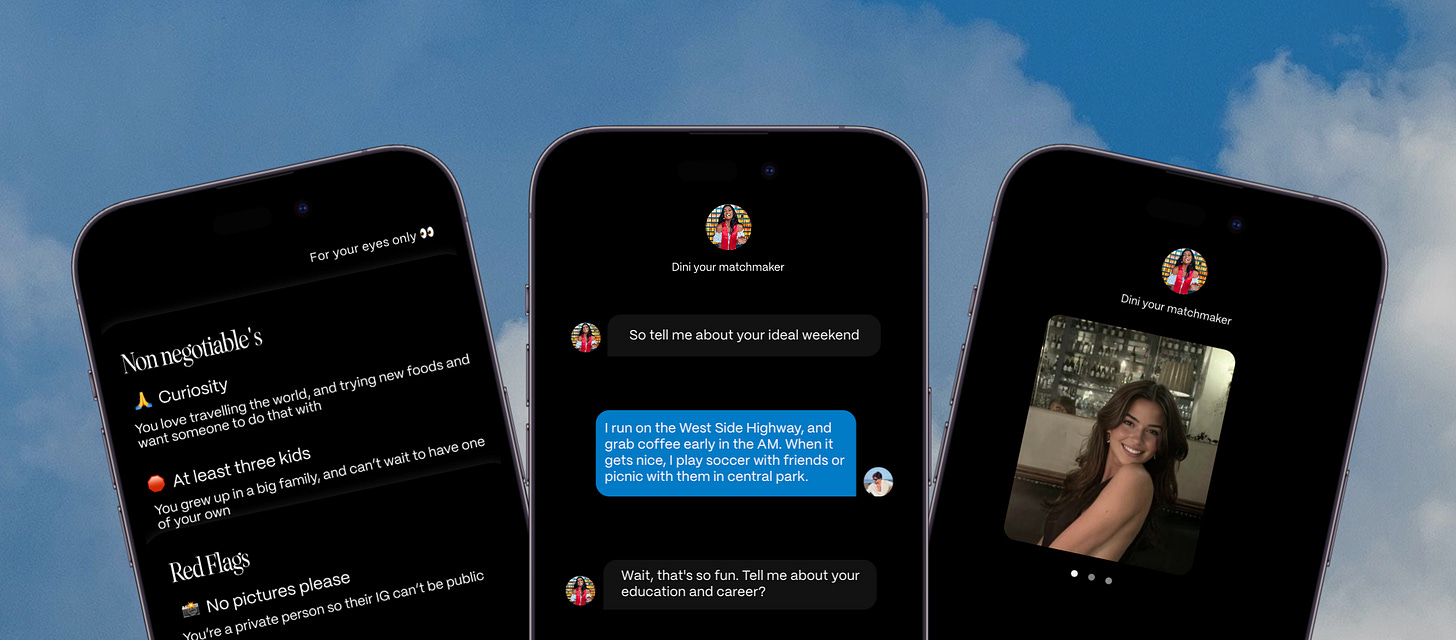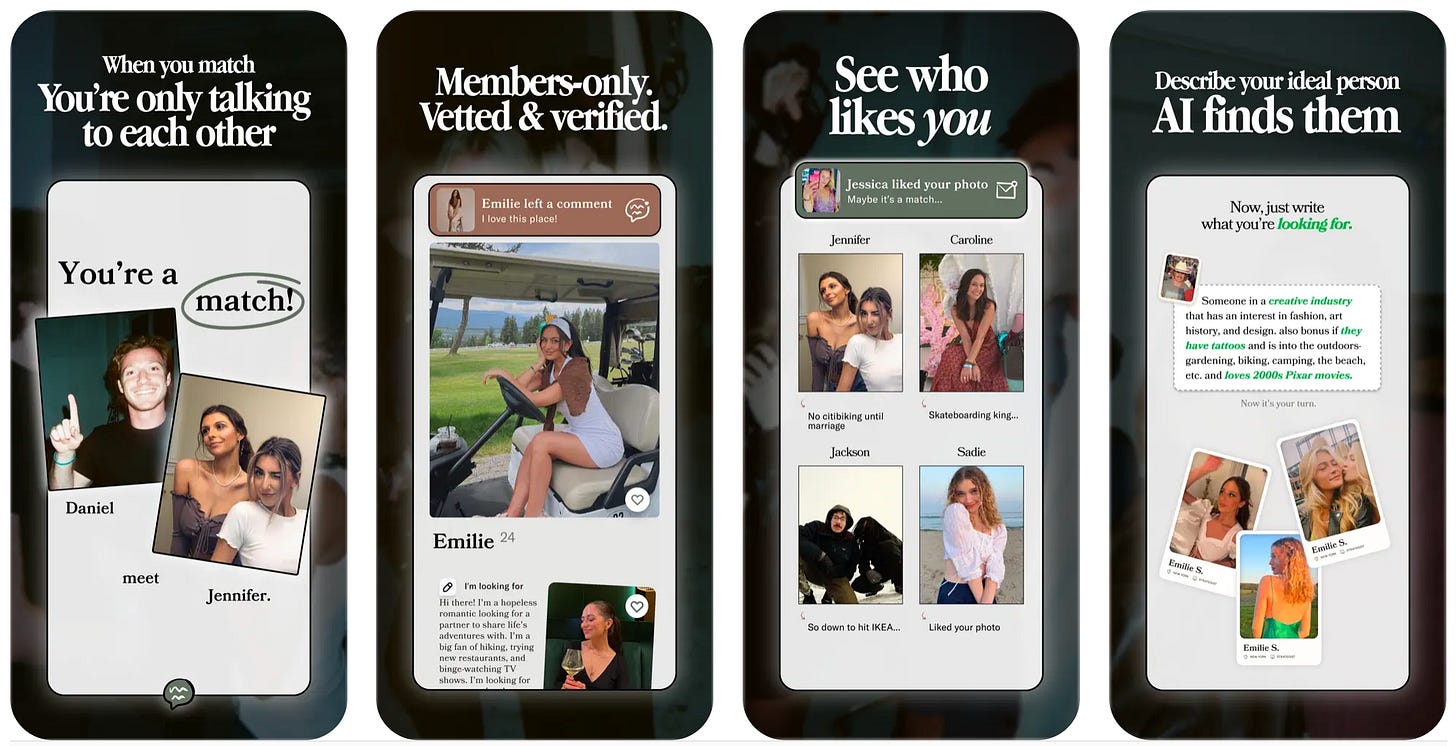Predictions: Dating and Relationships
People are opting out of the dating world. So what comes next?
People are always calling dating a “game.” But the game is changing.
This is the text thread I read after a friend posted a singles event:
“No thanks.”
”I’m out.”
”Yeah, no singles events for me. I’m in “Man-o-pause.”
Honestly, at first I judged them. Why not make the effort? Everyone hates the dating apps. Meeting people IRL has so much depth. (Side note: That’s just one of the reasons I got off the apps. Attraction just doesn’t shine through. I’ve met plenty of people who are attractive but when I looked up their online photos, I would have definitely swiped left).
I went to the event. I had a great time. A woman actually asked me out. We went out several times on interesting dates (hiking, a game night, improv show). We had a great time and I laughed a lot. Had good chemistry. But then it hit me…
It didn’t feel good, and I don’t even know why. I would feel heavy every time I made plans. And I felt anxious in the confusion. When I finally told her that I had a lot going on, it wasn’t that I felt relieved not to see her. I felt relieved when I finally gave myself permission to stop dating entirely.
So I not only stopped judging my friends. I started agreeing with them and asking more about how they felt.
“Dating feels like work. You have to do a lot to get ready. You have to bring your A-game and put on the charm. It just doesn’t feel worth it.”
While that would indicate low effort, I do think there’s a positive side to all of this. I’ve noticed that my friends and I are actually very engaged and excited with the various projects we’re working on. But it does beg the question - What does the future of dating look like?
Introducing the Ai Matchmaker
I mean really, why not? It’s not like perennially single people make the best choices. And the human matchmakers cost thousands of dollars.
Companies like Sitch are figuring out the balance - not thousands of dollars, but also not cheap - about $100 a month, which I think is great. (You know you’ve spent way more and gotten way less, and what’s the market value of a soul mate???).
I think they nailed the interface. If everything is going the way of prompts and chat, then this is a great UI design.
The Game of the Dating Game
There are new apps that are adding what are essentially, layers, rules and challenges. Apps like Cerca even allow people to play matchmaker. It will be interesting to see how they incentive and reward behaviors.
Cuffed limits you to talking to only one person at a time, so you actually give them a chance. Members are vetted, and of course there’s Ai, because Ai.
The Total Ai Disruption
By disruption, I mean total annihilation. The dating apps are programmed based on metaphors that de-humanize people:
And while there are better metaphors that are more natural (I’ve taken a stab at designing one), the problem is actually that we are just too human. We make decisions based on unconscious factors and then wonder why things don’t work out.
While we are not yet at Black Mirror Level Dating (watch this one. It’s fantastic)…
… I do believe something amazing is coming…
Dating based on Body Data
While the founder of Bumble talks about Ai coming in as a dating coach, the real disruption will happen when a contender figures out how to combine the incredible advances in voice analysis and facial recognition technology. I don’t know how. It’s above my pay grade. But I’m sure of it.
With just a few samples, the Ai will know everything and predict matches, because it skips the conscious mind (i.e. - the one talking to that AI coach, bullshitting everyone in the process, including themselves).
The Culture of Dating is: Me
Me as in me, me as in you, me as in everyone.
Oh the irony - Love is all about our care for another and yet, the trends are showing that we are all just focused on ourselves.
David Brooks writes about how over decades, moral values have been replaced by “therapeutic values” (well-being and psychological adjustment). Add that consumer/convenience culture that will “produce narcissistic individuals — self-absorbed, fragile and desperate for recognition.“
“It’s not surprising that a culture that centers the self is going to produce inverted theories of love.“ In such a culture people are naturally going to define love as the feeling they get when somebody satisfies their craving for positive and tender attention, not as something they selflessly give to another.” - David Brooks
See me. Hear me. Feel me.
At the end of the day, this seems to come down to acknowledgement. Here are quotes from the original source, on people saying why they fall in love:
“I fall in love when someone sees me in a way I didn’t know I could be seen. Not just compliments, but like—recognition. As in: I see the version of you that’s still trying… And I like her.”
“Falling in love is like seeing yourself reflected in someone else’s mind.”
“I fall in love when I don’t feel like I’m performing competence - when someone sees you in the absolute mess of it — your pain, your pettiness, your unpaid parking tickets.”
Boy does this seem like good news for narcissists looking to manipulate someone through their needs for validation. But on the positive side, I really hope we all learn to see and acknowledge people better. How will that work when we’re all in our little bubbles? (more on that in a later post).
Until then, I calling my shot on the future:
Future Buzzwords:
“Sensationships”
Sensationships will be based on pleasure instead of romance.
Uncertainty of the future + annui means people are not as concerned about shared beliefs and political views. They just want to have a good time.
Connections will be based on unique shared pleasures. (And suddenly a bunch of what used to be “icks” are now passable). This is the “eat dessert first” school of thought, prioritizing the most sensual over the most sensible.
So yes, not only will a left-leaning hippie connect with a right-wing conservative connect over their obsessive love of rock climbing in exotic locations - they actually might make a fetish of it.
But that does mean compromises:
“Ish Factor” > Ick Factor
“Ish” essentially means good enough. As in…
”Is he hot?”
”ish. He’s hot-ish.”
I think this will be great. Not so much about lowering standards as it is about lowering requirements. I only recently realized I have a couple red flags (that I discovered through a dinner party where I brought out my cards with intriguing questions). It was very humbling as I did feel a bit high on myself before that conversation.
(PS - If you want to know the truth from your friends, just use these exact words: “Would you please tell me what you think I don’t want to hear?”).
“The New Power Couple”
Husband and wife business teams have been around for awhile, but I think we’ll see a new wave of them. They’ll be rare, but a lot of people will have it on their vision boards under “Couple Goals.” I think you’d have to get all three to qualify:
Shared Values - Obvious, until you realize most people don’t know their values.
Shared Vision - Working together on the same goal from different, complementary angles (as opposed to two strong people working on different things).
Shared Sharing - They don’t just live it. They express it, online, together. They share their lessons, advice, the behind-the-scenes, and even current challenges. They are part private, part public and their fan base may not even be customers (though most likely future customers).
What’s not on this list? Beliefs. Or even agreement on reality. Both of these things can easily change over time, and (I believe) it will be healthier not to connect or judge others based on beliefs, but by their character and the value they provide.
What about you? What do you think is the future of dating and relationships?






Hi!! Antonia here, the writer of the essay How to fall in love you quoted. It’s been fascinating (+ a little surreal) to watch my piece circulate this way via David Brooks’s column… and now your Substack!
First, I really enjoyed your broader predictions - the AI matchmaking, “sensationships,” the future of how we structure relationships, etc. :) I’d argue that even as technologies and buzzwords change, our very human desire to be recognized/witnessed isn’t going anywhere. (If anything, in a fractured culture, it may be the most enduring constant..!)
Re your comments on my essay: Personally, I believe Brooks read it less on its own terms and more as a convenient foil for his point about narcissism. To me, the hunger to be seen/known isn’t narcissism at all! It’s simply the (obligatory) door we walk through before love can grow into the kind of selfless generosity he describes.
My essay wasn’t meant to define what love is (Brooks’s project) but to ask HOW we fall in love… as in the entry point, the texture, the strangeness of the beginning. Of course the answers skew toward recognition and selfhood; the “fall” is inherently self-reflexive. But falling ≠ being. Falling is that lovely shock of being seen. That doesn’t negate generosity - it just precedes it.
Anywho, thanks again for engaging so thoughtfully with all this, and for pulling me (and my essay) further into this rather exciting conversation about modern love. I never expected it to become “evidence” in the case of what love really means, but here we are! x x